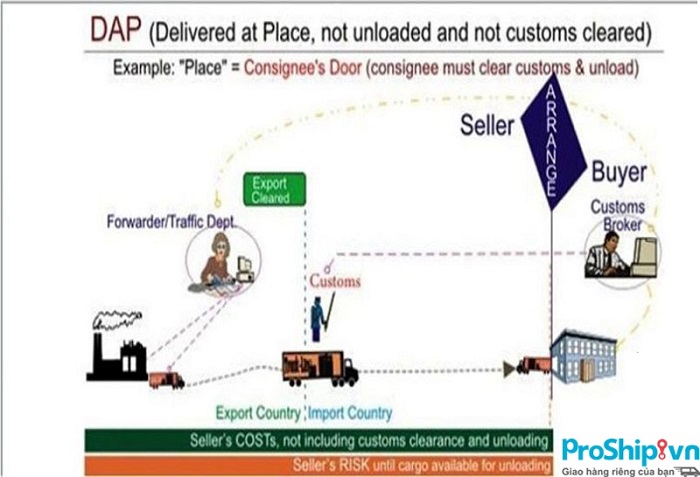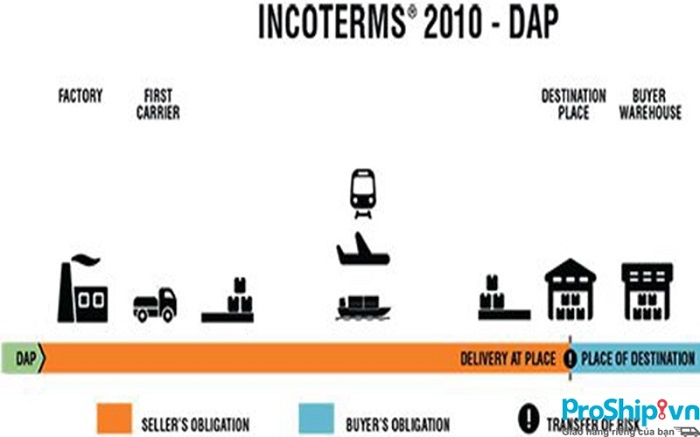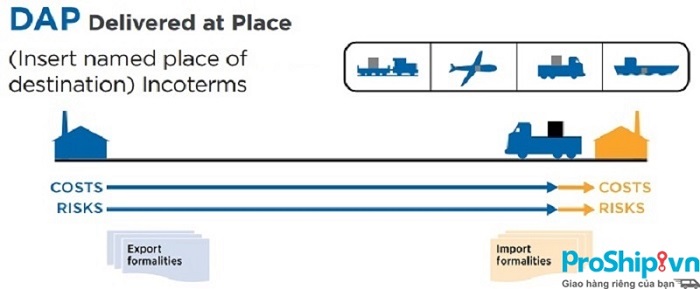x Bạn có nhu cầu chuyển giao hàng hóa theo điều kiện DAP?
x Bạn chưa hiểu DAP là gì? Các đối tượng liên quan có trách nhiệm, nghĩa vụ gì?
x Bạn muốn biết chính xác cách ứng dụng điều kiện DAP hiệu quả, đúng quy định?
Các vấn đề bạn quan tâm thắc mắc đặt ra ở trên liên quan đến điều kiện DAP là gì được Proship chia sẻ cụ thể nhất, từ đó giúp các đối tượng là người bán người mua dễ dàng xác định rõ vai trò của mình là gì trong kế hoạch chuyển giao hàng hóa đến địa điểm chính xác đã thỏa thuận từ trước. Không những vậy, Proship còn giúp bạn biết thêm về cách áp dụng quy định trong Incoterm 2010 về DAP sao cho hiệu quả, đúng cách nhằm hạn chế tối đa mọi trở ngại, vướng mắc phát sinh không đáng có.
XEM THÊM: Dịch vụ vận tải Container giá rẻ
Trong Incoterm 2010, khái niệm DAP được hiểu là gì?
Điều kiện DAP là gì?
Incoterms 2010 định nghĩa DAP (viết tắt của tiếng Anh: Delivered at Place, có nghĩa là Giao tại nơi đến) – người bán giao hàng khi hàng hóa được đặt theo ý của người mua trên phương tiện vận chuyển đến sẵn sàng để dỡ hàng tại địa điểm đích. Theo các điều khoản DAP, rủi ro chuyển từ người bán sang người mua từ điểm đến được đề cập trong hợp đồng giao hàng.
Khi hàng hóa đã sẵn sàng cho quá trình vận chuyển thì việc đóng gói cần được thực hiện bởi người bán bằng chi phí của mình để hàng hóa đến đích cuối an toàn, mau chóng. Mọi thủ tục pháp lý cần thiết ở nước xuất khẩu được hoàn thành bởi người bán bằng chi phí và rủi ro của mình để xóa hàng hóa xuất khẩu.

Và sau khi hàng hóa đã đến ở nước đến, người mua phải hoàn tất thủ tục hải quan ở nước nhập khẩu. Ví dụ: Giấy phép nhập khẩu, giấy tờ theo yêu cầu của hải quan,…bao gồm tất cả thuế hải quan và thuế. Theo các điều khoản DAP, tất cả các chi phí vận chuyển với bất kỳ chi phí đầu cuối nào đều được người bán thanh toán đến điểm đến như thỏa thuận. Tất nhiên, dựa theo các điều khoản DAP thì chi phí bốc dỡ hàng hóa cần thiết tại điểm đến cuối cùng phải do người mua chịu.
Vai trò, nghĩa vụ của bên bán & bên mua trong điều kiện DAP Incoterm 2010
Dựa theo những quy định trong Incoterm 2010, bên bán và bên mua có trách nhiệm, nghĩa vụ sau:
|
A. NGHĨA VỤ CỦA NGƯỜI BÁN |
B. NGHĨA VỤ CỦA NGƯỜI MUA |
| A1. Nghĩa vụ chung của người bán | B1. Nghĩa vụ chung của người mua |
| Người bán phải cung cấp hàng hóa và hóa đơn thương mại phù hợp với hợp đồng mua bán và cung cấp tất cả bàng chứng phù hợp mà hợp đồng có thể đòi hỏi.Bất kỳ chứng từ nào được đề cập trong mục A1-A10 đều có thể là các chứng từ hoặc thông điệp điện tử tương đương nếu được các bên thỏa thuận hoặc tập quán quy định. | Người mua phải thanh toán tiền hàng như quy định trong hợp đồng mua bán.Bất kỳ chứng từ được đề cập trong mục B1 – B10 đều có thể là các chứng từ hoặc thông điệp điện tử tương đương nếu được các bên đồng ý hoặc tập quán quy định. |
| A2. Giấy phép, kiểm tra an ninh và các thủ tục khác | B2. Giẩy phép, kiểm tra an ninh và các thủ tục khác |
| Nếu có quy định, người bán phải tự chịu rủi ro và chi phí để lấy bất kỳ giấy phép xuất khẩu hoặc giấy phép chính thức khác và phải thực hiện mọi thủ tục hải quan cần thiết để xuất khẩu hàng hóa và vận tải qua các nước trước khi giao hàng. | Nếu có quy định, người mua phải, tự chịu rủi ro và bằng chi phí của mình lấy giấy phép nhập khấu hoặc các giấy phép chỉnh thức khác và làm thủ tục hải quan để nhập khẩu hàng hóa. |
| A3. Hợp đổng vận tải và bảo hiểm | B3. Hợp đồng vận tải và bảo hiểm |
| a) Hợp đồng vận tảiNgười bán phải, bằng chi phí của mình ký hợp đồng vận tải để chuyên chở hàng hoá tới nơi đến chỉ định hoặc tới một địa điểm thỏa thuận, nếu có, tại nơi đến chỉ định. Nếu không thoả thuận được một địa điểm đến cụ thể hoặc không quyết định được theo tập quán, thì người bán có thể chọn một địa điểm tại nơi đến phù hợp nhất với mục đích cùa mình.
b) Hợp đồng bảo hiểm Người bán không có nghĩa vụ với người mua về ký kết hợp đồng bảo hiểm. Tuy vậy, nếu người mua yêu cầu và chịu rủi ro và chi phí, nếu có, người bán phải cung cấp cho người mua những thông tin cần thiết để mua bảo hiểm. |
a) Hợp đồng vận tảiNgười mua không có nghĩa vụ đối với người bán về ký kết hợp đồng vận tải.
b) Hợp đồng bảo hiểm Người mua không có nghĩa vụ đối với người bán về ký két hợp đồng bảo hiểm. Tuy vậy. nếu người bán yêu cầu, người mua phải cung cấp cho người bán các thông tin cần thiết để mua báo hiểm. |
| A4. Giao hàng | B4. Nhận hàng |
| Người bán phải giao hàng bằng cách đặt hàng hóa dưới quyền định đoạt cùa người mua trên phương tiện vận tải chở đến và sẵn sàng để dỡ tại địa điếm đã thỏa thuận, nếu có, tại nơi đến vào ngày hoặc trong thời hạn giao hàng đã thỏa thuận. | Người mua phải nhận hàng khi hàng hóa được giao theo mục A4. |
| A5. Chuyển rủi ro | B5. Chuyến rủi ro |
| Người bán phải chịu tất cả rủi ro về mất mát hoặc hư hỏng của hàng hóa cho đến khi hàng hóa được giao theo mục A4 trừ trường hợp mất mát hoặc hư hỏng trong các trường hợp quy định tại điều B5. | Người mua phải chịu mọi rủi ro về mất mát hay hư hỏng cùa hàng hoá kể từ khi hàng đã được giao theo mục A4. Nếua) người mua không hoàn thành nghĩa vụ của mình theo mục B2 thì người mua phải chịu mọi rủi ro về mất mát hay hư hỏng của hàng hóa xảy ra từ việc đố, hoặc
b) người mua không thông báo theo mục B7, thì người mua chịu mọi rủi ro về mất mát hay hư hỏng của hàng hóa kể từ ngày thỏa thuận hoặc ngày hết hạn của thời hạn thỏa thuận cho việc giao hàng, với điều kiện là hàng đã được phân biệt rõ ràng là hàng của hợp đồng. |
| A6. Phân chia chi phí | B6. Phân chia chi phí |
| Người bán phải trả:a) Ngoài các chi phí phát sinh từ mục A3a), mọi chi phí liên quan tới hàng hoá cho đến khi hàng đã được giao theo mục A4; ngoại trừ những chi phí người mua trả theo mục B6;
b) Chi phí đỡ hàng tại nơi đến mà người bán phai chịu theo hợp đồng vận tải; và c) Chi phí về thủ tục hải quan, nếu có, cần thiết để xuất khẩu cũng như tất cả các thứ thuế, lệ phí và chi phí khác phải trả khi xuất khẩu và chi phí vận chuyển qua bất kỳ nước nào trước khi giao hàng theo mục A4. |
Người mua phải trảa) Tất cả các chi phí liên quan đến hàng hóa từ kể từ khi hàng được giao theo mục A4;
b) Tất cả các chi phí dỡ hàng cần thiết để nhận hàng từ phương tiện vận tải tại nơi đến chỉ định, trừ khi những chi phí này do người bán chịu theo hợp đồng vận tải; c) Các chi phí phát sinh nếu ngưòi mua không hoàn thành nghĩa vụ của mình theo mục B2 hoặc không thông báo theo mục B7 với điều kiện hàng đã được phân biệt rõ ràng là hàng của hợp đồng; và d) Nếu có, tất cả các chi phí thủ tục hải quan cũng như thuế, lệ phí và các chi phí khác phải trả khi nhập khẩu hàng hóa. |
| A7. Thông báo cho người mua | B7. Thông báo cho người bán |
| Người bán phải thông báo cho người mua các thông tin cần thiết để người mua có thể áp dụng các biện pháp thông thường cần thiết để nhận hàng. | Người mua phải, khi quyết định được thời gian trong khoảng thời gian thỏa thuận và/hoặc địa điểm nhận hàng lại nơi đến chỉ định, thông báo cho người bán đầy đủ về việc đó. |
| A8. Chứng từ giao hàng | B8. Bằng chứng giao hàng |
| Người bán phải chịu phí tổn cung cấp cho người mua chứng từ để người mua có thể nhận hàng theo mục A4/ B4. | Người mua phải chấp nhặn chứng từ giao hàng do người bán cung cấp theo mục A8. |
| A9. Kiểm tra – Đóng gói, bao bì – Ký mã hiệu | B9. Kiểm tra hàng hoá |
| Người bán phải trả các chi phí về việc kiểm tra (như kiếm tra chất lượng, cân, đo, đếm) cần thiểt để giao hàng theo quy định ờ mục A4, kể cả các phí tổn cho bất kỳ việc kiểm tra nào trước khi gửi hàng theo yêu cầu của các cơ quan có thẩm quyền ở nước xuất khẩu.Người bán phải, bằng chi phí của mình, đóng gói hàng hóa, trừ khi theo thông lệ của ngành hàng cụ thể, hàng hoá được vận chuyển không cần đóng gói. Người bán có thể đóng gói hàng phù hợp với phương thức vận tải, trừ khi người mua thông báo cho người bán yêu cầu cụ thể về đóng gói trước khi hợp đồng được ký kết. Bao bì phải được ghi ký mà hiệu thích hợp. | Người mua phải trả các chi phí cho việc kiểm tra bắt buộc trước khi gửi hàng, ngoại trừ việc kiểm tra theo yêu cầu của các cơ quan có thẩm quyền ở nước xuất khẩu. |
| A10. Hỗ trợ thông tín và chi phí liên quan | B10. Hỗ trợ thông tin và chi phí liên quan |
| Nếu có quy định, người bán, theo yêu cầu của người mua, do người mua chịu rủi ro và phí tổn, phải giúp đỡ người mua để lấy các chứng từ và thông tin kể cả thông tin an ninh mà người mua cần đề nhập khẩu và/hoặc vận tải đến địa điểm cuối cùng.Người bán phải hoàn trả cho người mua tất cả chi phí và lệ phí phát sinh trong trường hợp người mua đã chi để lấy hoặc giúp đỡ đề lấy được những chứng từ và thông tin theo mục B10. | Người mua phải thông báo cho người bán một cách kịp thời các yêu cầu về thông tin an ninh để người bán có thế thực hiện mục A10. Người mua phải hoàn trả cho người bán tất cả chi phí và lệ phí mà người bán đã chi để lấy hoặc giúp đỡ để lấy được những chứng từ và thông lin theo mục A10.Nếu có quy định, theo yêu cầu của ngươi bán, do người bán chịu rủi ro và phí tổn, người mua phải giúp đỡ người bán một cách kịp thời để lấy hoặc giúp đỡ đế lấy các chứng từ và thông tin kể cả thông tin an ninh mà người bán cần để vân tải, xuất khẩu hàng hóa và vận tải qua nước khác. |

Những lưu ý khi sử dụng điều kiện DAP vận chuyển hàng hóa
Khi sử dụng điều kiện DAP, cá nhân người bán và người mua cần lưu ý
Trước tiên, hãy phân tích thêm về điều kiện DAP (kho người mua). Đây là thỏa thuận mà hai bên muốn người bán sẽ làm mọi việc để chở hàng đến tận kho của người mua, chỉ trừ 2 việc là người bán không làm thủ tục hải quan nhập khẩu (tức không đóng thuế nhập khẩu) và không thực hiện việc bốc dỡ hàng hóa xuống khỏi xe tại kho của người mua.
Và khi hàng đến cảng đến hoặc sân bay đến, người mua phải làm các thủ tục hải quan nhập khẩu cần thiết rồi người bán mới tiếp tục vận chuyển hàng về kho của người mua. Nếu người mua không hoàn thành việc thông quan nhập khẩu thì rắc rối sẽ xảy ra khiến người bán phải chịu phí phạt lưu bãi hay phí phạt của nhà xe,…thậm chí người mua còn khiếu nại ngược lại người bán vì không giao hàng về kho đúng thời hạn thỏa thuận từ trước.

Một điều rõ ràng ở đây là do lỗi của người mua không thông quan nhập khẩu nhưng lại bắt người bán phải chịu phạt không đáng có. Như vậy, để tránh mâu thuẫn này có thể phát sinh, thông thường 2 bên nên chọn giải pháp là “Hãy để người bán làm mọi việc – kể cả thông quan nhập khẩu, để người bán có thể chủ động trong mọi việc”.Việc của người mua là chỉ cần đợi hàng về xưởng của mình và dỡ xuống là xong. Khi đó, hai bên sẽ lựa chọn điều kiện DDP và người bán sẽ làm tất cả mọi việc để giao hàng đến tận kho người mua. Thế nên, cả bên bán cũng như bên mua cần phải hết sức lưu ý để đưa ra phương án xử trí hiệu quả tốt nhất.
Như vậy, khi thực hiện quá trình chuyển giao hàng hóa, người bán và người mua nếu đặc biệt quan tâm đến vai trò cụ thể của mình là gì có thể tham khảo để xác định rõ ràng. Điều kiện DAP là gì và cách sử dụng nó ra sao đều đã được Proship chuyển tải, bạn nên dựa vào những kinh nghiệm trên để hoàn thành tốt mọi nghĩa vụ của mình. Và để được hỗ trợ, tư vấn thêm về Dịch vụ vận chuyển hàng hóa đường biển, đường sắt, đường bộ, đường hàng không,…khối lượng lớn giá tốt cạnh tranh, vui lòng liên hệ qua hotline 0909 344 247
📦 Hotline Liên Hệ Vận Chuyển
🧭 Miền Trung

